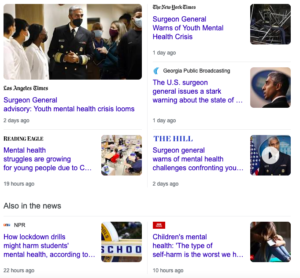Covid-19, undoubtedly, has had a significant impact on mental health spanning across all demographics. It has been the focus of headlines, especially within the past few days, after the U.S. Surgeon General spoke just to the concerning extent and severity the pandemic has had on young people.

Dr. Bryan Pearlman, EdD, LMSW is a Life Change Specialist, Mental Performance Coach, Educator, Mediator & Author. Daily, Bryan works with children, teens, adults, couples, and families to progress in their day-to-day lives, school, careers, and relationships with a focus on achieving balance. Dr. Pearlman spoke about the impact of Covid-19 on mental health and coping strategies, as well as some of the signs of anxiety and depression in kids and teens.
“At our practice, the pandemic is something that’s brought up quite frequently,” Dr. Pearlman says. “The impact on everybody in society has been profound. We see a lot in increased anxiety, increased depression, and just the re-traumatization.”
As Dr. Pearlman said, there has been an increase in anxiety and depression. During a pandemic, the symptoms have been exacerbated. How do you know if your child or student is experiencing anxiety and/or depression?
“There are definitely signs of anxiety and depression in kids, teens, and adolescence to look out for. I think the important thing is to just look at and pay attention to changes, like appearance, for example. If your child is normally very talkative and that changes, or if your child is starting to isolate, or if they’re normally very social and they have lots of activities to do with others and are choosing not to do that, whether it’s anxiety, depression, or something else, it seems like that would be a great opportunity for a conversation with them.”
He emphasizes that the conversation doesn’t need to be a huge deal… You just want to show that you’re paying attention, that you’re there for them and just being supportive. It could be as simple as, “Hey, I’ve noticed that you’re spending a lot more time at home,” or, “I’ve noticed that you’re a lot quieter than you usually are. I’m here for you, I care about you. How can I help? What do you need? Let’s just talk”. Additionally, Dr. Pearlman encourages parents to ask their child at the end of the day about their mood, like having the child assign a mood rating for the day, as he says that it can be quite telling, too.”
Dr. Pearlman offers more signs that a child may be experiencing anxiety, depression, or some other mental health concern, such as changes in sleep routine, appetite, or that the child is not as active as they usually are. He mentions that when he works with clients at the practice (Dr. Lena Pearlman & Associates), he always asks about how the individuals sleep is, as well as how their appetite and exercise has been.
Looking at coping strategies and effective techniques, Dr. Pearlman says, “As we work with clients, we focus a lot on putting our efforts towards what we can control. We work with our clients on not spending as much time on things out of our control, because we can spend a lot of energy, become really stressed and anxious worrying and putting forth all of that effort, when in reality, it isn’t going to change anything.”
He continues by talking about an intervention he often uses with clients:
“We all have a journal. We all have a to-do list. I encourage something called the ‘to-don’t list’. Every week, I encourage clients to come up with something that we want to remind ourselves not to do. For example, maybe one of the to-don’t items would be to not worry about things that are out of our control,” he says. “When working with people in the practice, we definitely meet the client where they are. We talk about us not having all the answers and being okay with not having all the answers. We work towards doing things that can keep us safe, happy, healthy, and just continuing to move forward one step at a time… Eventually, we also know that the pandemic, or whatever situation we are dealing with is just temporary. Helping our clients understand that there is light at the end of the tunnel is vital.”
Dr. Lena Pearlman & Associates is a St Louis mental health therapy practice in Creve Coeur, Missouri. The practice has a team of mental health therapists who provide therapy and counseling services to kids, teens, adults, couples, and families. Dr. Lena Pearlman & Associates specializes in stress, anxiety, depression, relationships, and other mental health related issues and concerns. The practice can be reached by phone at: 314-942-1147, by email at: bryan@stlmentalhealth.com or on the web at: www.STLmentalhealth.com. The office is located at: 655 Craig Road, Suite 300, St. Louis, MO 63141. Find Dr. Bryan Pearlman on Twitter at: @DrP_Principal.